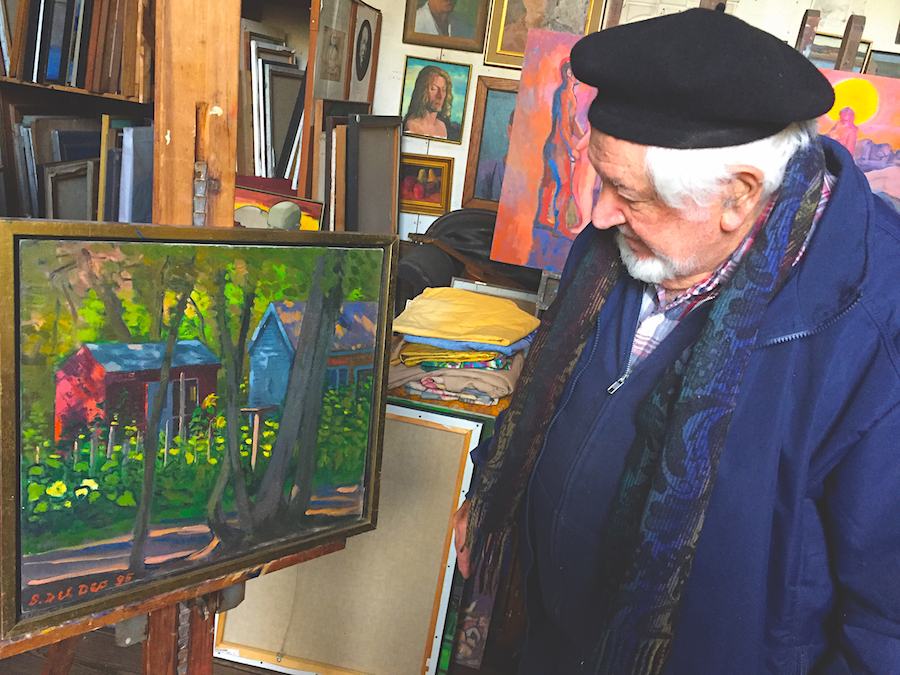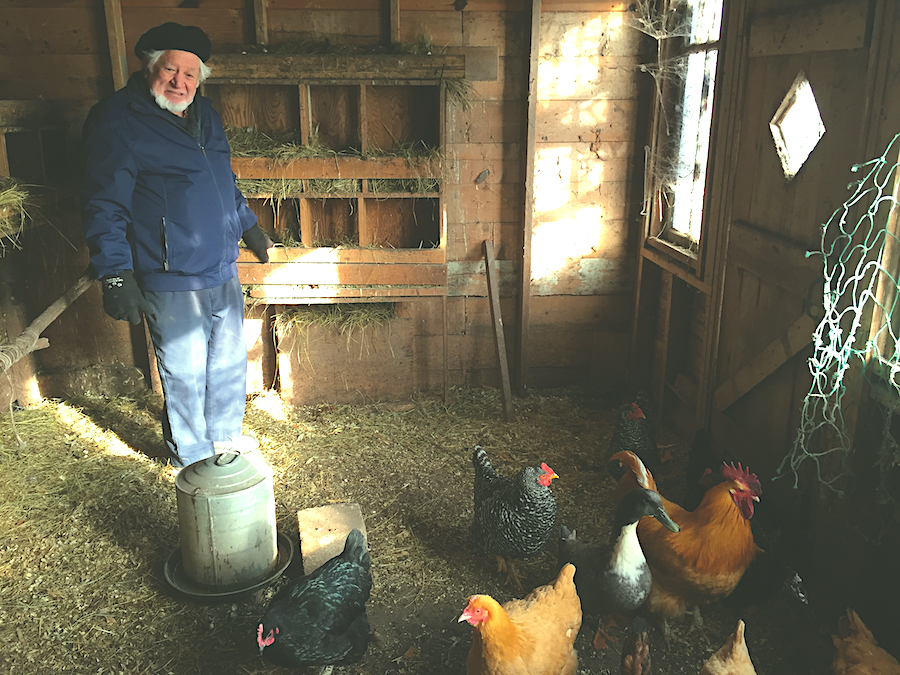
Salvatore Del Deo sits in his kitchen on a snowy December afternoon, holding a jar of dried beans. “My favorites of all the favorites,” he says, holding them up to the light. “These are Romano beans, but we call them Portuguese beans, because they were given by an Italian farmer to a Portuguese guy from Provincetown about 100 years ago. I swear to God, they are the most wonderful beans in the world.”
Most people know Del Deo, age 94, for his paintings — he’s been a major figure in the local art colony since he moved to Provincetown as a young man. But tucked away in the woods of the East End is his garden plot, a living masterpiece that he says “isn’t what it used to be” but that nonetheless captivates with its artistry and history. Starting last year, Dani Niedzielski, co-owner of the Captain’s Daughters tea shop in Provincetown, began helping him bring it back.
In its heyday, Del Deo’s “homestead,” which he tended with his late wife, Josephine, included pigs, goats, chickens, ducks, numerous fruit and nut trees, and a large garden area. The chickens, some trees, and the garden remain, and Niedzielski added a beehive last year.
“The thing that is really striking to me about the property is not just the fact that it has been this working farm in the center of Provincetown but also the incredible history and heritage of some of the things growing there,” she says. “Last spring, I harvested rhubarb from a 100-year-old plant and made five strawberry rhubarb pies. Everything on the property has a story.”

The rhubarb came from a plant given to Del Deo by Alan Chace of East Orleans. According to Del Deo, the two men were on a committee working to create Cape Cod Regional Technical High School in the late 1960s and became friends while trying to get an agricultural program started at the new school. “He showed up at my house one day with the cutting from a rhubarb planted by his grandfather or great-grandfather,” says Del Deo. “They were an old family with a big farm, and the rhubarb still produces quite a bit.”
“Another thing that’s really special are the two fig trees,” says Niedzielski. They were given to Del Deo by his father and uncle, and “represent a tie with my family in Italy,” he says. “The unusual thing about figs that most people don’t realize — if there’s a severe storm or an unusually cold winter, the tree will appear dead.” It is dead on the surface, says Del Deo, but not underground. “Chances are it will resurface. It’s very hard to kill a fig tree. Mine are each over 100 years old.”
Most of Del Deo’s favorite vegetables are also Italian. “We always planted the Di Ciccio broccoli,” he says. “These days it’s popular in the stores, but when we first started, it was hard to find.” He also recommends “rapa,” a bitter broccoli relative in the Brassica genus. “What an acquired taste — it’s fabulous! I steam it with olive oil, water, lemon juice, salt and pepper, and a couple of red pepper flakes to get that tangy flavor. Steam it till it goes limp. It’s a marvelous vegetable.” And he loves to grow a variety of hot pepper called quadrato. “It means squared,” he says. “And they are — they’re square and very prolific, green, and red.”
When Del Deo started his garden six decades ago, the soil was pure sand. “So I got the bright idea of going to Shank Painter Pond with a couple of five-gallon buckets every day and taking the silt from the ponds,” he says. “By the end of the winter I had a 12-foot-square patch of soil that was pretty good.” Then he went “whole hog,” feeding two pigs with scraps from Ciro & Sal’s, the restaurant he once co-owned in town, and adding goats, chickens, ducks, and geese.
“After that I didn’t have to go back to the pond, because I had all these animals for manure,” he says. “In all my years, I’ve never used commercial fertilizer.”
The first year he and Josephine kept pigs, Del Deo slaughtered them himself. “What a mess,” he remembers. But he didn’t give up. In the following years, he brought the animals to New Bedford to be butchered. “[Josephine’s] great joy was to be able to take the head of the pig and extract the meat from the jowls to make scrapple,” a cooked dish made by mixing cooked meat from the head with broth and cornmeal into a savory pudding.
Though Del Deo’s family is Italian, he says he has learned a great deal from observing Portuguese gardening traditions in Provincetown. “I had apple trees,” he says, “but I’ve realized over my 72 years here that the Portuguese people who settled here all had pear trees because they do well here. Apples — not so much.” Apples prefer a colder climate, Del Deo explains, but the pears — planted before dwarf varieties were introduced — can grow to be 40 to 50 feet tall locally.
“One tree was enough for three or four families,” he says. “You could fill bushels and bushels. Only one or two of these trees are left, but there used to be more.”
Some of the fruit trees in Del Deo’s garden “we just joke about,” says Niedzielski. “My cherry tree has been the love of my life and the bane of my life,” Del Deo says with a laugh. “I think of the hundreds of cherries this tree has produced, I’ve only ever eaten one.” Most are taken by the birds or hit with blight. But ultimately, Niedzielski says, the fruit isn’t the point. “I love listening to Sal tell me what it’s been like.”
“I believe in regeneration,” says Del Deo. “I’m not one of these guys who gets old and says, ‘Oh, it was better before.’ ”
Niedzielski laughs. “If I told him tomorrow that I’m bringing 12 pigs and 20 goats, he would be thrilled,” she says, adding that she feels a garden, 10 chickens, and a duck is plenty. “But that’s Sal,” she adds. “He’s a dreamer.”



